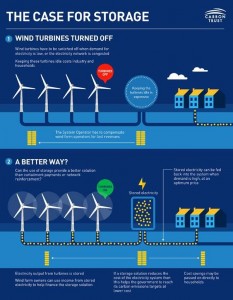Centrica, Dong Energy, SSE, Scottish Power, Statoil and Wood Group – Clean Energy (previously SgurrEnergy) have signed up to a new collaborative initiative, the Energy Systems Innovation Platform (ESIP), launched by the Carbon Trust.
The group aims to solve key issues currently preventing a more effective transition to a low cost and low carbon energy system. Collectively, ESIP partners represent almost 50 percent of the electricity supply market in the UK and hold significant renewable energy and conventional generation portfolios. ESIP has also received initial support from the Scottish Government and the Foreign & Commonwealth Office (FCO).
The Carbon Trust said the collaboration will develop solutions to overcome barriers currently deterring investment in flexibility solutions such as energy storage. Solutions will be based on rigorous and transparent analysis and relate to issues such as regulation, lack of transparency in decision making and long-term business models necessary to encourage the right investments now to potentially save billions of pounds a year for consumers by 2030. The ESIP will take an “impartial and technology neutral perspective” on opportunities for energy storage to provide increasingly needed flexibility services to the UK’s electricity system.
Andrew Lever, director of innovation at the Carbon Trust, said: “There is now general consensus that the UK energy markets needs to be revamped so we can embrace a flexible and more decentralised energy system. However the fragmented nature of the energy market is driving fragmented decision making and many investments are led by technology not market needs. There is an urgent need for an open forum where the wider industry can collaborate to solve common issues in order to capitalise on recent storage innovation. ESIP fills that gap.”
Last year the Carbon Trust led a study with industry and government partners, that identified that the UK could be saving up to £2.4bn every year by 2030 if flexibility solutions such as energy storage were integrated into the UK electricity system to help balance the grid, improve the utilisation of renewable energy assets and reduce or defer the need for costly grid reinforcements.
Nils Lehmann, ESIP project manager at the Carbon Trust, said: “ESIP’s focus on developing viable business models for storage use cases aligned with system benefits is a vital piece of the puzzle which has not been looked at yet. ESIP works in an evidence-based way to address market failures while simultaneously identifying commercial opportunities for industry. This can help to overcome the “chicken and egg” dilemma between market creation and industry deployment that often limits the uptake of promising new solutions.”
Related content:
Jack of all trades: storage is being held back by its complex offering
Network operators want storage option
Further reading for subscribers:
Interview: Professor Phil Taylor, Newcastle University
Interview: Jill Cainey, Electricity Storage Network
Subscribe to New Power for full analysis, comment, interviews and data in our monthly report, and access to our database, or sign up to our FREE e-newsletter for website updates
